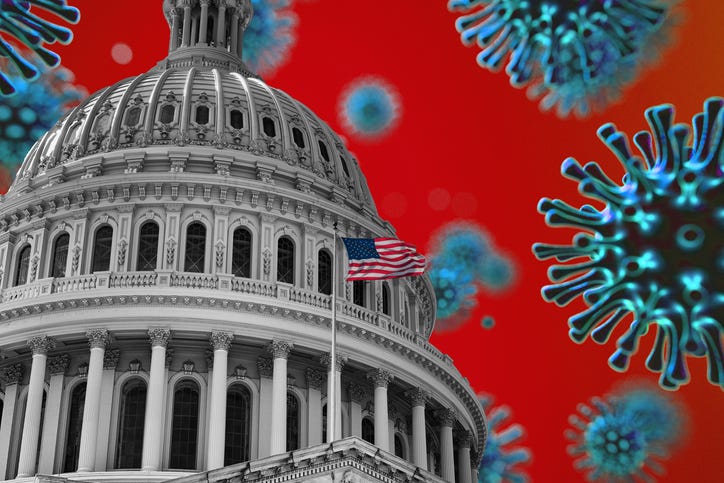The Pandemic is not a Partisan Game
Congress should do its job and probe the origins of COVID-19 on a bipartisan basis.
Last week, the National Institutes of Health (NIH) finally admitted that it funded gain-of-function research at the Wuhan Institute of Virology. Worse, it also failed to adequately monitor its grantee, EcoHealth Alliance. The NIH letter containing these admissions should have come much sooner and in response to serious bipartisan oversight from Congress. Instead, the NIH reply came in response to inquiries from the top Republican on the House Energy and Commerce Committee.
Democrats have refused to investigate funding for EcoHealth, citing fears that such questions might, “deflect accountability for the Trump Administration’s failed response to this crisis.” Since Democrats control both the House and the Senate, congressional requests do not come with the signature of a committee chair. This allows agencies to more easily ignore Congress without fear of consequence.
Two months ago, the Biden administration released an unclassified two-page report that came to no conclusion on the origins of COVID19, and the White House pledged no rest in efforts to understand how the pandemic began. “We will do everything we can to trace the roots of this outbreak that has caused so much pain and death around the world, so that we can take every necessary precaution to prevent it from happening again,” President Biden said.
But are they? Not really.
Since then, Director Francis Collins of the NIH has announced he is leaving as the agency continues to defy congressional and Freedom of Information Act requests for documents. And David Morens, a senior advisor to Anthony Fauci at the National Institute of Allergy and Infectious Diseases (NIAID), quickly threw cold water on Biden’s pledge, arguing to National Geographic that “at some point, it crosses over from doing due diligence to wasting time and being crazy. We may have seen that point already.”
To this day, the White House has done little to discover how the pandemic started, and Democrats in control of Congress have fallen in line and failed to ask hard questions.
From early 2020, Anthony Fauci and allied virologists have worked hard to shut down inquiries, especially any investigation that examines whether the virus leaked from a lab accident in Wuhan, China. NIH documents recently made public explain why. For several years, Fauci’s NIAID funded dangerous gain-of-function virus research at the Wuhan Institute.
If it were ever definitively proven that Fauci’s grants for virus research helped start the pandemic, that would likely end his career along with funding for virologists who do gain-of-function studies. No one has seriously alleged the grants directly led to the pandemic, but Fauci still aggressively wagged his finger at questions that even hint at the possibility of that risk. He huffed and puffed that he “resents” the implication. But, stonewalling instead of simply embracing transparency only raises more questions.
At Empower Oversight, we recently sent Members of Congress a briefing document that outlines their powers to investigate the origins of this pandemic and urges them to put partisan differences aside for the sake of more than 741,000 Americans killed by the virus.
The President is correct when he says that cooperation from China would be helpful. But plenty of questions about funding for gain-of-function research in Wuhan remain unanswered here at home.
Fauci’s NIAID funneled hundreds of thousands of dollars to Peter Daszak’s EcoHealth Alliance. And, Daszak’s relationship with the Wuhan lab is so problematic in the scientific community, that a task force run by the medical journal Lancet shut down because of its ties to EcoHealth.
If the medical community is alarmed about these financial ties to Wuhan, why isn't Congress?
Besides receiving millions of dollars in research grants, EcoHealth has also received $1.5 million in coronavirus loans from the Small Business Administration. Federal dollars should come with federal scrutiny and enforced transparency.
Congress could empower and task any one of several independent entities to investigate taxpayer funds provided to Daszak and EcoHealth, including the Special Inspector General for Pandemic Recovery, the Pandemic Response Accountability Committee, and the Congressional Oversight Commission. Any of the three could examine loans and NIH grants to EcoHealth using existing resources and expertise.
The legislative branch should also pursue answers through its own oversight committees. Members must put their constitutional obligations ahead of partisan loyalties—not pull punches merely because the current majority in Congress is of the same political party as the administration.
In 2017, Chuck Grassley (R-IA) was Chairman of the Senate Judiciary Committee and fought with a Republican White House for the right of Democrats serving as Ranking Members to get answers. He even held up one of his own party’s nominees until the White House acquiesced with a policy that required agencies make their “best efforts” to reply to requests from the members of the minority party in Congress.
It is unclear whether the Biden administration has officially rescinded that policy. But NIH’s failure to provide documents to Republican Ranking Members looks more like an attempt to protect Dr. Fauci, Mr. Daszak, and EcoHealth from scrutiny than “best efforts” to be transparent with the American public and its elected representatives.
Partisan bickering and gamesmanship are a disservice to average Americans who care much more about getting to the bottom of how the pandemic started and preventing the next one.
Congress has a constitutional obligation to understand why so many died.
This virus knows no political party, and Americans of every political and ideological background deserve answers to these important questions. Their elected representatives have the authority, and the duty, to get those answers.
Jason Foster is Founder & President of Empower Oversight Whistleblowers & Research, and former Chief Investigative Counsel to the Senate Judiciary Committee.


